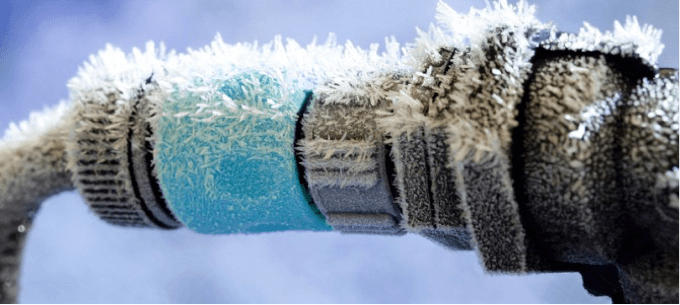Living in the Bay Area, you’re definitely familiar with a few chilly days, right? Though we certainly enjoy nice weather throughout the year, you just never know when you’ll need to throw on a jacket.
And what about when winter comes along? In addition to keeping yourself warm from the chill in the bay air, it’s important to spend some time winterizing pipes in your home keep them in good shape when temperatures drop.
That’s right – your home’s plumbing needs some extra attention as the seasons change. But have no fear, as the team at Benjamin Franklin Plumbing has a few tips that will definitely help.
How to Winterize Water Pipes in a Few Do-it-Yourself Steps
Our bay area team of professional plumbers is happy to offer you this step-by-step guide that will take you through the steps needed to winterize plumbing in your home. You can do it!
Photo courtesy of Frost King
Make Sure Your Home’s Pipes Are Insulated
One of the first things you can do when you’re wondering how to winterize your home plumbing is purchase a thick layer of insulation that you can then wrap around your pipes. These insulating tubes, as pictured above, are made of fiberglass or polyethylene, and can be purchased online or at a hardware store.
For extra protection, we recommend wrapping your home’s pipes in heat-tape before you apply the insulation to give them additional protection from cold temperatures. It’s important to keep an eye on manufacturer instructions when approaching any do-it-yourself task, so be sure to do so beforehand, as they may have a few recommendations for how to winterize your home plumbing.
Let Faucets Drip if You Know It’s Going to Be a Very Cold Night
In addition to investing in heat-tape and insulation to get your pipes ready for winter, we also recommended letting your faucets drip overnight if the temperature is going to drop below freezing. Though this may be rare in the Bay Area, it’s good to know just in case the weather forecast says it’s going to be extraordinarily cold! By doing this, you’re able to eliminate some of the pressure that builds up in your home’s pipes and as a result, pipes are less likely to burst, even if they do freeze.
Fix Exterior Cracks in Your Home’s Walls
Another way to lessen the likelihood that your home’s pipes may freeze on a particularly cold bay area night involves fixing exterior cracks in your home’s walls. This is an effective way to prevent cold air from seeping into your home and affecting the temperature of your pipes. All you have to do is locate the crack and use caulking or spray foam installation to fill them in. It’s really as simple as that! But it’s a very proactive way to approach the do-it-yourself task of winterizing pipes.
Insulate Crawl Spaces, Basement Windows, & Garage Doors
Photo courtesy of Pretty Handy Girl
Here’s an additional proactive way to get your home’s pipes ready for cold temperatures. It involves taking a close look at your home’s crawl spaces, basement windows (if you have them) and garage doors. Once again, cold air loves to seep through these open areas and make contact with your pipes. If these openings aren’t sealed, your pipes are definitely at risk to freeze – and potentially burst – if the temperature gets low enough. You can cover vents using pieces of cardboard (heavy duty is best) and you can then use duct tape to keep it in place.
Open Cabinets Below Your Home’s Sinks to Let Heat Inside
Photo courtesy of Love of Family and Home
In addition to sealing off potential gaps in garage door, crawl space and basement window insulation, here’s something quick and easy you can do to that’s great for your home’s pipes. Simply open the cabinets below any sinks in your home. That’s it! By opening them, you’re allowing more heat to reach the pipes, which will prevent them from freezing. So there you have it – a few handy tips to help you figure out how to winterize plumbing quickly and effectively. Simply go through this list one by one and ensure your home’s pipes are ready for colder winter temperatures. As always, if you’re still not quite confident when it comes to answer the question of how to winterize water pipes, please don’t hesitate to give your local Benjamin Franklin Plumbing team a call.







